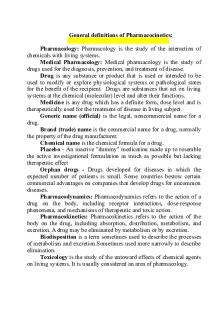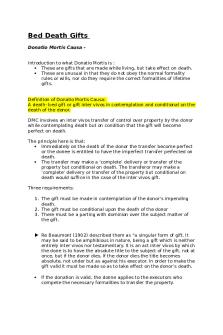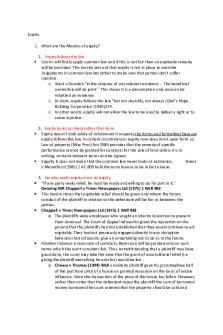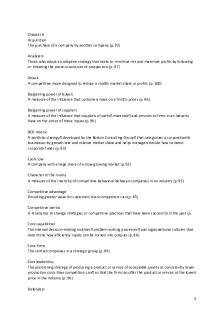Bed Death Gifts - Key Notes for main exams. PDF

| Title | Bed Death Gifts - Key Notes for main exams. |
|---|---|
| Author | Divya Lakhani |
| Course | Equity and Trusts |
| Institution | University of Brighton |
| Pages | 5 |
| File Size | 102.9 KB |
| File Type | |
| Total Downloads | 34 |
| Total Views | 193 |
Summary
Key Notes for main exams....
Description
Bed Death Gifts Donatio Mortis Causa – Introduction to what Donatio Mortis is : These are gifts that are made while living, but take effect on death. These are unusual in that they do not obey the normal formality rules or wills, nor do they require the correct formalities of lifetime gifts.
Definition of Donatio Mortis Causa: A death- bed gift or gift inter vivos in contemplation and conditional on the death of the donor. DMC involves an inter vivos transfer of control over property by the donor while contemplating death but on condition that the gift will become perfect on death. The principle here is that: Immediately on the death of the donor the transfer become perfect or the donee is entitled to have the imperfect transfer perfected on death. The transfer may make a ‘complete’ delivery or transfer of the property but conditional on death. The transferor may make a ‘complete’ delivery or transfer of the property but conditional on death would suffice in the case of the inter vivos gift. Three requirements: 1. The gift must be made in contemplation of the donor’s impending death. 2. The gift must be conditional upon the death of the donor 3. There must be a parting with dominion over the subject matter of the gift.
Re Beaumont (1902) described them as “a singular form of gift. It may be said to be amphibious in nature, being a gift which is neither entirely inter vivos nor testamentary. It is an act inter vivos by which the done is to have the absolute title to the subject of the gift, not at once, but if the donor dies. If the donor dies the title becomes absolute, not under but as against his executor. In order to make the gift valid it must be made so as to take effect on the donor’s death.
If the donation is valid, the donne applies to the executors who compete the necessary formalities to transfer the property.
It is an exception to the rule that equity will not perfect an imperfect gift.
Requirements for a valid donatio Originally the three requirements for a valid donation were laid down by Lord Russell CJ in Cain v Moon (1896) as being:
The gift must be in contemplation of death, though not necessarily in the exception of death. The subject matter of the gift must be delivered to the donee; and The gift must be made under circumstances which shows that the property will revert to the donor if he recovers.
The test was restated in Re Craven (1937) Firstly, A clear intention – ONLY if donor dies o whereas if the donor DOES NOT DIE – NO EFFECT: and the donor is to have back the subject matter of the gift. Secondly: The gift must have made in contemplation of death by which is meant not the possibility of death at some time or other, but death within the near future, what may be called death for some reason believed to be impending. Thirdly: The donor must part with dominion over the subject matter of the duration
As such there are three key points 1. Intention to give if the owner dies 2. Owner is expecting to die in the near future 3. Owner must part with the gift.
Parting with dominion The donor is required to part with dominion or control over the property during his lifetime. Mere intention to make a gift to the done is insufficient for these purposes. What is needed is some overt act of physical transfer to the donee during the lifetime of the donor.
It is required to be established that the donor has lost control over the asset during his lifetime and, at the same time, the donnee has acquired control over the subject matter of the gift. With regard to tangible movable property (chattels) this condition will be satisfied if the donor has delivered the chattel to the donee with the intention that the property in the chattel will be transferred on death. This test will not be satisfied where the donor has merely transferred the custody over the property to the donee.
The test was restated in Re Craven (1937) Facts :
A daughter delivered a deposit note to her mother for safe custody. Two years , when the daughter was seriously ill, she told her mother : ‘The bank note is not for you if I do.’ The issue was whether a valid DMC was created. The court held: That the antecedent delivery sufficed and it was not necessary for the mother to hand back the note and for the daughter to redeliver it when she expressed her intention. Thus, a valid DMC was created.
Contemplation of death The principle: The usual situation is where the donor is ill and fears they will die. Requirement is more specific – DIE SOMEDAY However, the donor does NOT need contemplate immediate death or be on his death bed to satisfy this principle. Test is subjective – and involves a question of fact Vallee v Birchwood (2013) : Facts : o The donor declared that he was unlikely to survive during Christmas, even though this was some four months between the gift and death, was sufficient to satisfy the test of impeding death. o It was irrelevant that the donor was not suffering from any terminal illness. o It was irrelevant the donor did not have the time or opportunity to make a will. HELD: Valid. “the question was not whether he had good grounds to anticipate his imminent demise or whether his demise proved as speedy as he may have feared but whether the motive for the gift was that he subjectively contemplated the possibility of death in the near future”
This issue was simply whether the donor subjectively contemplated the possibility of death in the near future.
The contemplation of death is entirely subjective.
Another case: Wilkes v Allington (1931) Facts: A held a mortgage over the farm belonging to his niece and nephews. In 1922 he was diagnosed with cancer and refused treatment. In August 1925 he was ill in bed and thought he was dying he stated “I have instructed the executor to give you back that mortgage when I am gone, tear it up’. In 1927 he handed over the mortgage deeds and written on them was a note “to be given up at death W Allington”. In January 1928 he died. HELD: there was a clear contemplation of death. It didn’t matter that he died from pneumonia rather than the cancer, nor that his death occurred several months after he parted with the gift. Had he recovered the gift would have been revoked.
Donor need not die of the cause/disorder that he contemplates he will die from. Fact: Donor suffering from cancer, he transferred his mortgage deed to his nieces, but died a mth later when he caught a chill on a bus journey & died of pneumonia.
King v Dubrey (2015): more recent case- the court found that the donor: -
-
Should be contemplating his impending death which means death in the near future for a specific reason. However: found in this case that the dontio was a valid even though she was not thought to be ill, had not visted a doctor in some time, was not about to undergo surgery. However, evidence was abducted that she had attempted to changer her will 3 times shortly before death was sufficient to show that the donation was made in contemplation of death. o Intention to give conditional upon death o A donation is only effective once the donor is dead
o Sen v Hedley (1991) “the gift must be made upon condition that it is to be absolute and perfected only on the donors death, being revocable until that event occurs and ineffective if it does not” o Therefore the donor can change his mind at any time up until death, or if he recovers from his illness, it is automatically revoked...
Similar Free PDFs

CRPC Notes for Exams
- 117 Pages

Coownership Notes FOR Exams
- 16 Pages

Bed-making procedure notes
- 4 Pages

Gifts 19 - Lecture notes 1
- 11 Pages

Gifts and Failure of Gifts
- 5 Pages

Gifts AND Failure OF Gifts
- 18 Pages

Main terms for pharmacology
- 9 Pages

final exams for RMIT
- 3 Pages

Questions for exams/test
- 9 Pages

Super Cheatsheet for Exams
- 4 Pages

CCST9045 Note for Exams
- 1 Pages
Popular Institutions
- Tinajero National High School - Annex
- Politeknik Caltex Riau
- Yokohama City University
- SGT University
- University of Al-Qadisiyah
- Divine Word College of Vigan
- Techniek College Rotterdam
- Universidade de Santiago
- Universiti Teknologi MARA Cawangan Johor Kampus Pasir Gudang
- Poltekkes Kemenkes Yogyakarta
- Baguio City National High School
- Colegio san marcos
- preparatoria uno
- Centro de Bachillerato Tecnológico Industrial y de Servicios No. 107
- Dalian Maritime University
- Quang Trung Secondary School
- Colegio Tecnológico en Informática
- Corporación Regional de Educación Superior
- Grupo CEDVA
- Dar Al Uloom University
- Centro de Estudios Preuniversitarios de la Universidad Nacional de Ingeniería
- 上智大学
- Aakash International School, Nuna Majara
- San Felipe Neri Catholic School
- Kang Chiao International School - New Taipei City
- Misamis Occidental National High School
- Institución Educativa Escuela Normal Juan Ladrilleros
- Kolehiyo ng Pantukan
- Batanes State College
- Instituto Continental
- Sekolah Menengah Kejuruan Kesehatan Kaltara (Tarakan)
- Colegio de La Inmaculada Concepcion - Cebu




